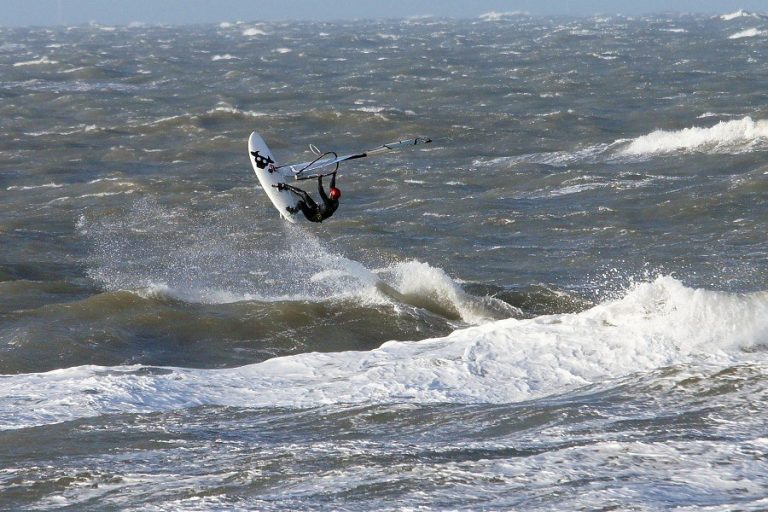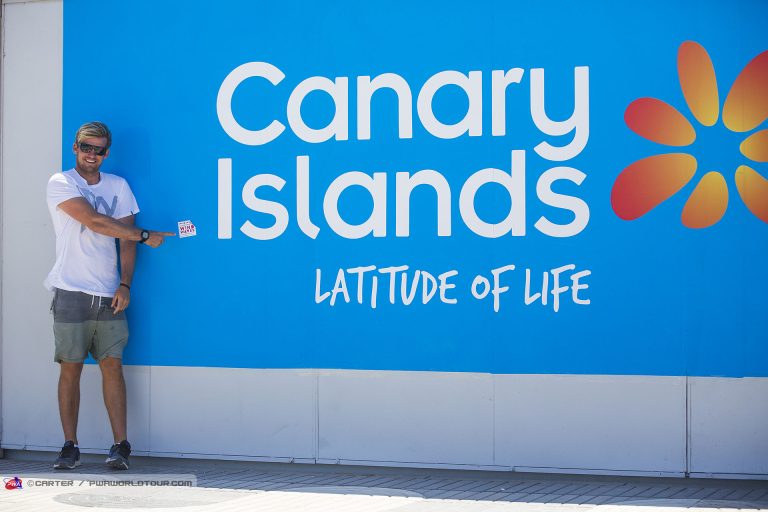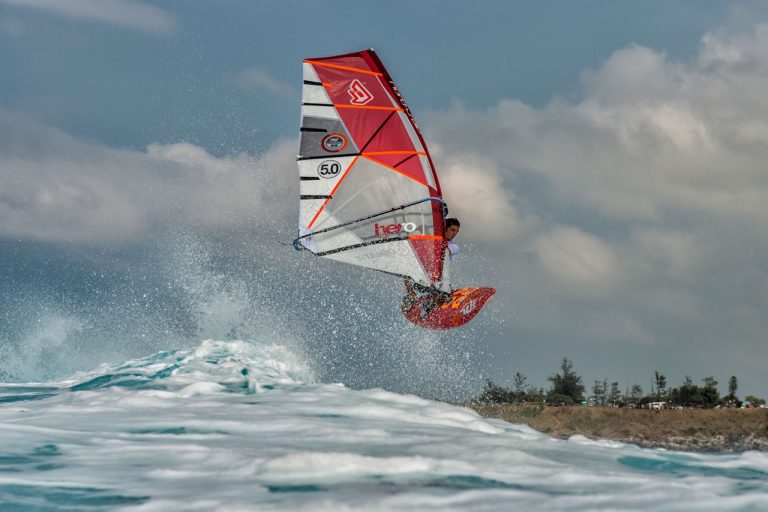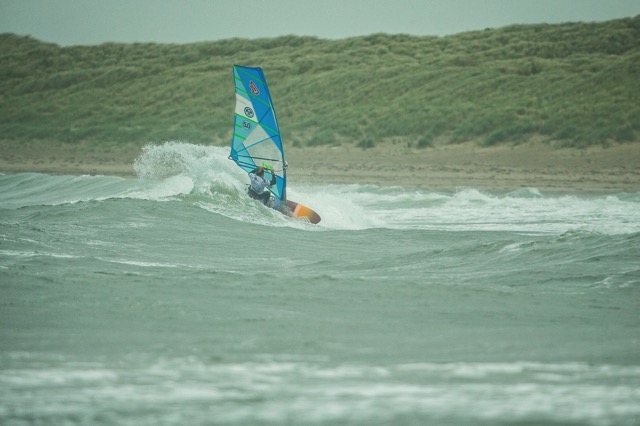This month on Boards it’s all about the youth and the future stars of windsurfing, but as we all know you can’t stay a kid forever! So if you’re a junior that loves windsurfing you might want to start thinking about how you can turn your love for the sport into a career when you’re older…
When you find yourself designing a board for an A-level project you’re probably already one step towards realising you might quite like a career in windsurfing!
But how do you do it? Every year hundreds of windsurfers decide they want to make their passion their life, and across the industry everyone who’s succeeded has their own unique story as to how windsurfing became their career.
One thing you rarely hear, however, is regret. There’s a reason for that.
“There hasn’t been one moment I wished I hadn’t gone down this path,” admits Tris Best, founder and director of the Official Test Centre (OTC) in Portland.
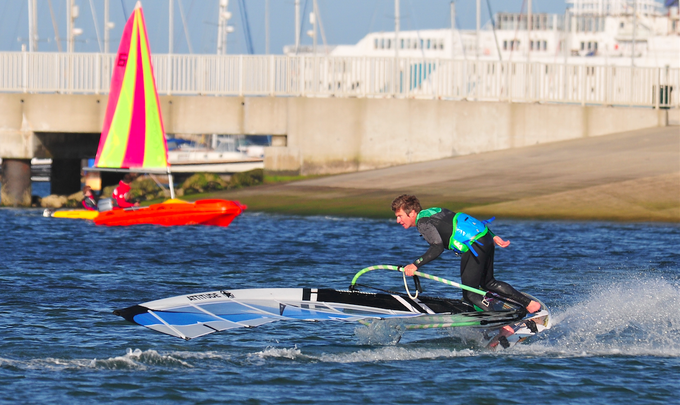
“The industry is always changing and keeping you on your toes; brands used to be brought in by distributors when I first started out, for example, now most are dealt with by agents. On the plus side there are countless jobs for instructors as more centres spring up year on year, which equals more new jobs, new avenues and new opportunities. Everyone gets knockbacks, it’s getting back up that’s important.”
Don’t rule anything out
From instructing to kit design, sales to professional athlete, marketing to running a centre, events co-ordinator to specialist travel agent, once your foot’s in the door that’s when you can really start to see what the industry is about.
Having started windsurfing aged 12, then really seeing his skills flourish while living with his family in Rhosneigr on Anglesey and then Cyprus, Tris knew he loved the sport but there was no obvious route into it asides from getting his RYA instructor qualifications and teaching and coaching.
He didn’t think much would come of instructing other than the chance to travel and enjoy summer holidays working overseas. But to keep his options open he studied Design and Technology – including that board design project – as one of his A-levels, followed by an Industrial Design degree at Loughborough University.
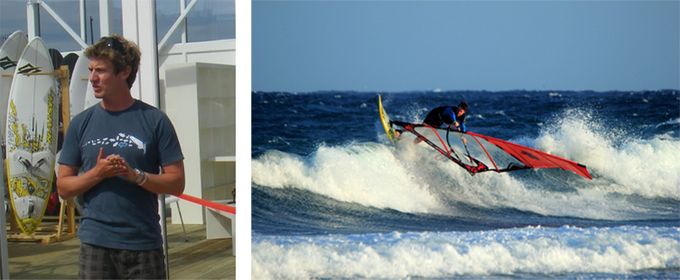
However, during one summer working as an instructor at the WildWind centre in Vassiliki, he met Simon Dawkins, then Test Editor at Windsurf Magazine. And after the pair bonded over trying to master the flat water forward Tris wasn’t about to waste the opportunity to ask to join Simon’s test team. Two months later the call came, and at 22 he was appointed Features Editor.
“I worked at Wildwind for three years during university, and that came purely because after my initial interview I kept pestering the guy to give me a job!” Tris continues. “Instructing opens more doors than it closes, and it allowed me to really see what the lifestyle was like.
“I didn’t study anything specifically windsurfing related at university but I still use parts of the course every day. The biggest thing I learned was work ethic; we pulled a lot of all-nighters towards the end, which stands you in very good stead for running a small business. Presentation skills, and the ability to stand in front of a group of people to present, pitch and sell an idea or concept was also invaluable. My degree also helped me understand how products work in their market.”
Every avenue
Tris’ experience isn’t unusual. You’ve only got to pick a couple of other industry ‘names’ to realise no route in is the same.
Take Starboard Brand Manager, Tiesda You, as another example. Tiesda started windsurfing at 10, growing up in a family of windsurfers in the Middle East.
At 15, during two months when he couldn’t windsurf following a back operation, he started sketching designs and shaping boards and fins, before in 1996, he moved to London to pursue a Masters in Mechanical Engineering at UCL. This specialised in aspects of fluid dynamics, production control, thermodynamics, material science, advanced mathematics and mechanics, invaluable in his future career.
After graduating in 2000, Tiesda joined Starboard, becoming responsible for board and fin development, design and production by 2002. A year later he created Drake Windsurfing Fins, and his passion for discovering the ‘new’ has never waned.
Speaking in the Starboard Windsurfing 2014 Tiki Documentary ‘Tiesda You and the Atom IQ’ he said: “It’s actually more exciting for me to work on deck and sail than it is for me to work on a twin fin board. All of a sudden you find this excitement to develop a rig that goes into the back of your car or an inflatable board, you know.”
Tom Buggy, meanwhile, proves that while windsurfing may be your starting point, once you’re in you can never predict what direction your career will go.
After years competing on the UKWA circuit and clocking up over 10,000 hours teaching as an RYA instructor, including on the hallowed West Coast of Australia, Hill Head-raised Tom diversified into boat building and yacht racing. He moved on to the Extreme Sailing Sailing, as class support and logistics as well as a crewmember, and also does PR stunts with Land Rover, racing a foiling kiteboard!
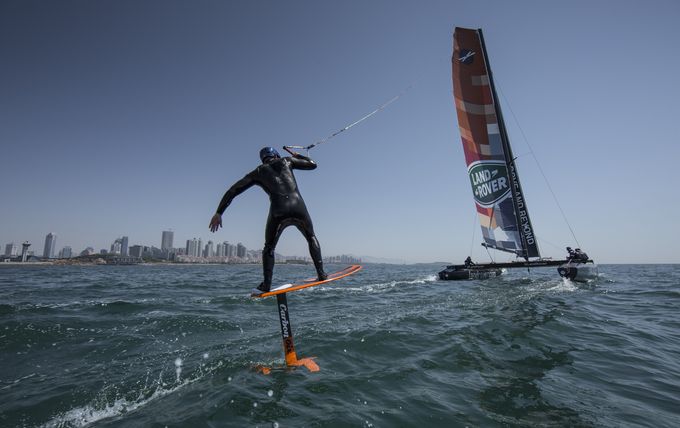
Credit – Lloyd Images
What if I don’t know where to start?
Teaching within the RYA windsurfing schemes is progressive.
You can become an Assistant Instructor (AI) trained to assist instructors in teaching to Youth Stage 1 and 2, and adult Start Windsurfing courses under the supervision of an RYA Senior instructor (SI). You just need to be of an intermediate non-planing personal windsurfing level, and there’s no age restriction. From 16 you can qualify as an RYA Start, Intermediate and/or Racing instructor (planing and non-planing) and at 18 you can become an Advanced instructor or Senior Instructor (SI).
But even people with no experience in the sport have the chance to develop the skills that will take them towards a windsurfing career, with some schools and RYA Training Centre establishing special pathway courses.
One of these is UKSA in Cowes, which runs a ‘Watersports Instructor Training Diploma’, for young people aged 19-24, offering the chance to access training as part of their education or career development, with up to 50 students a year benefiting.
Meanwhile, London Nautical School (LNS) runs BTECs in sailing and watersports and Maritime Studies as one of a number of colleges and Further Education establishments offering subjects providing insights into water-based careers.
Alby Scott had never windsurfed before he started studying for his national VRQ in

maritime studies at LNS. He had always loved water, and first developed a love for sailing at LNS before windsurfing started to intrigue him.
When he first got on a board at Docklands Sailing and Watersports Centre, it wasn’t instant success. But fuelled by his desire to get better, and with great support he improved. For three years Alby took advantage of the fact Minster Windsurfing Academy was near where he has a chalet in Sheerness, Kent and spent his summers at the centre, working as an AI and slalom racing, doing the local circuit on 6.3 sails.
Alby currently works in post-production in London, but he hasn’t given up on the dream of forging a parallel life in windsurfing.
“I loved windsurfing with a passion. It’s a lifestyle I’d love to live, to be able to windsurf every day of my life,” he admits.
“James Buller at LNS and Richard Sheridan at DWSC were great teachers and instructors and always told me I could do it. They pushed me towards competing and progressing and I did. I loved working with kids and would really like to get back into instructing. To be honest I didn’t realise the careers in windsurfing were there.”
Maybe now Alby can see anything is possible if you want to make it happen.
For more information on training and careers in windsurfing visit www.rya.org.uk/go/training

